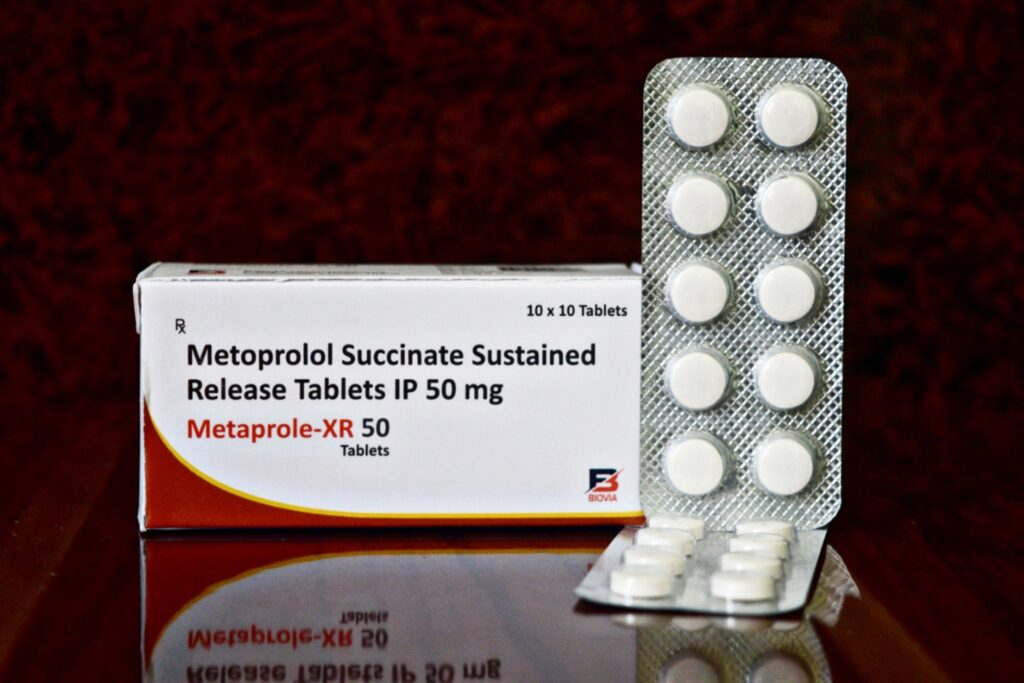📌 Medicine Name:
Metoprolol Tablet 50 mg
(Available as Metoprolol Tartrate or Metoprolol Succinate)
📋 Description / Prescription:
Metoprolol is a prescription-only beta-blocker used to manage several cardiovascular conditions:
Indications include:
- Hypertension (high blood pressure)
- Angina pectoris (chronic chest pain)
- Heart failure (especially with reduced ejection fraction – HFrEF)
- Arrhythmias (e.g., atrial fibrillation, SVT)
- Post-myocardial infarction (MI)
- Off-label uses: migraine prevention, essential tremor, thyrotoxicosis symptoms
👉 Metoprolol Tartrate (short-acting): usually taken twice daily
👉 Metoprolol Succinate (extended-release): usually taken once daily
Each tablet contains 50 mg of metoprolol.
🔬 Nature / Mechanism of Action:
- Selective β1-adrenergic receptor blocker
- Decreases heart rate, blood pressure, cardiac output, and myocardial oxygen demand
- Helps stabilize heart rhythm and reduce cardiac workload
✅ Advantages / Therapeutic Benefits:
- ✅ Effectively controls blood pressure
- ✅ Reduces frequency of angina attacks
- ✅ Prevents cardiac remodeling post-MI
- ✅ Improves survival and quality of life in patients with heart failure
- ✅ Helps in controlling fast heart rhythms
- ✅ Reduces migraine frequency and improves thyrotoxic symptoms
📦 Packaging:
- Available as film-coated tablets, typically round or oval
- May be scored for dose splitting
- Packaged in blister strips or plastic bottles
- Common packs: 10, 14, 30, 50, or 100 tablets
🌡️ Storage:
- Store at 15–30°C (59–86°F)
- Protect from light, moisture, and heat
- Keep out of reach of children
⚠️ Precautions:
Use with caution in patients with:
- Bradycardia (slow heart rate)
- Heart block (2nd or 3rd degree)
- Asthma or COPD — may worsen bronchospasm
- Diabetes — may mask hypoglycemia symptoms
- Peripheral vascular disease
- Liver dysfunction
🚫 Do not stop abruptly — risk of rebound hypertension, tachycardia, or angina
Potential drug interactions:
- Calcium channel blockers (verapamil, diltiazem)
- Digoxin
- Clonidine
- NSAIDs (may reduce BP effect)
👩⚕️ Patient Advice / Counseling Points:
- 💊 Take with or just after food (improves absorption and reduces GI upset)
- 🕒 Take at the same time each day
- 📉 Monitor heart rate and BP regularly
- 🚫 Do not stop suddenly—must be tapered off by a doctor
- 🚗 May cause drowsiness or dizziness—use caution when driving or operating machinery
- 📞 Call your doctor if you experience:
- Slow heartbeat
- Shortness of breath
- Swelling of feet or hands
- Unusual fatigue, cold extremities

